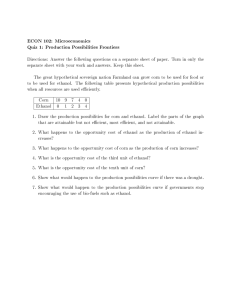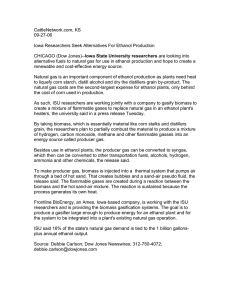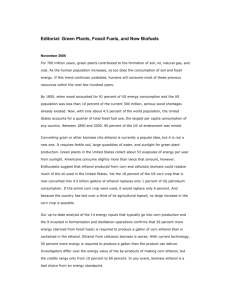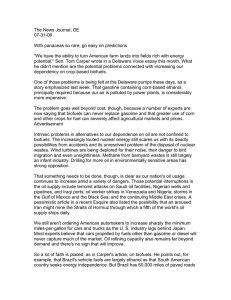Des Moines Register 10-06-06 Ethanol biorefinery will be built in Iowa
advertisement
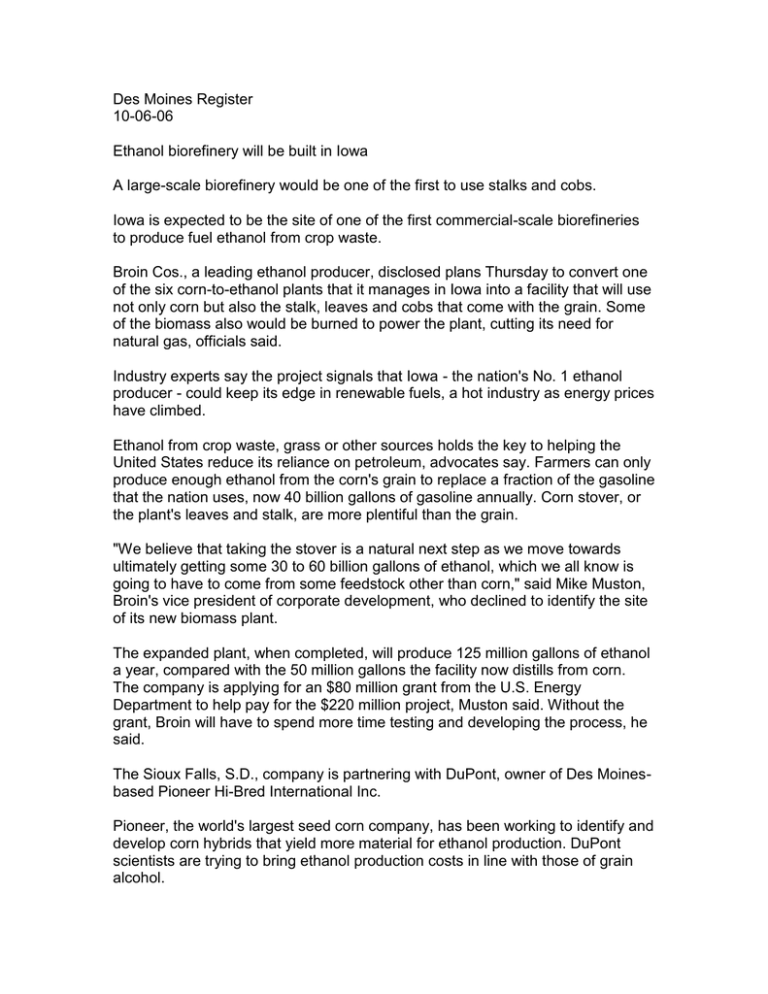
Des Moines Register 10-06-06 Ethanol biorefinery will be built in Iowa A large-scale biorefinery would be one of the first to use stalks and cobs. Iowa is expected to be the site of one of the first commercial-scale biorefineries to produce fuel ethanol from crop waste. Broin Cos., a leading ethanol producer, disclosed plans Thursday to convert one of the six corn-to-ethanol plants that it manages in Iowa into a facility that will use not only corn but also the stalk, leaves and cobs that come with the grain. Some of the biomass also would be burned to power the plant, cutting its need for natural gas, officials said. Industry experts say the project signals that Iowa - the nation's No. 1 ethanol producer - could keep its edge in renewable fuels, a hot industry as energy prices have climbed. Ethanol from crop waste, grass or other sources holds the key to helping the United States reduce its reliance on petroleum, advocates say. Farmers can only produce enough ethanol from the corn's grain to replace a fraction of the gasoline that the nation uses, now 40 billion gallons of gasoline annually. Corn stover, or the plant's leaves and stalk, are more plentiful than the grain. "We believe that taking the stover is a natural next step as we move towards ultimately getting some 30 to 60 billion gallons of ethanol, which we all know is going to have to come from some feedstock other than corn," said Mike Muston, Broin's vice president of corporate development, who declined to identify the site of its new biomass plant. The expanded plant, when completed, will produce 125 million gallons of ethanol a year, compared with the 50 million gallons the facility now distills from corn. The company is applying for an $80 million grant from the U.S. Energy Department to help pay for the $220 million project, Muston said. Without the grant, Broin will have to spend more time testing and developing the process, he said. The Sioux Falls, S.D., company is partnering with DuPont, owner of Des Moinesbased Pioneer Hi-Bred International Inc. Pioneer, the world's largest seed corn company, has been working to identify and develop corn hybrids that yield more material for ethanol production. DuPont scientists are trying to bring ethanol production costs in line with those of grain alcohol. Broin hopes to start construction of the plant in early 2007 and open it in 2009, Muston said. Although in its early stages, the Broin-DuPont project signals a turning point in the development of cellulosic ethanol from being merely the subject of research to a viable - and sizable - source of alternative fuel, experts said. "These are two smart companies that bring a lot to the table," said Mike Ott, executive director of BIOWA, an industry consortium based in Iowa City. President Bush has called for making biomass ethanol cost-competitive with corn ethanol by 2012, a goal no company is known to have achieved yet. "There's lots of competition," said Robert Brown, head of Iowa State University's Office of Biorenewables Programs. Archer Daniels Midland Co., VeraSun Energy Corp., Iogen Corp., and Abengoa Bioenergy Corp., among others, are pursuing production of cellulosic ethanol. "Many of them are contemplating building pilot plants very soon," Brown said. "I would say they all think they're in the lead on it. ... It's going to take a few years to figure out which one has the competitive edge." Abengoa is building a biomass plant in Spain that will use wheat straw as its feedstock. The company also is seeking an Energy Department grant to construct a U.S. facility at an as-yet-undisclosed site. Other companies, including Canada-based Iogen, want to build biorefineries. "Numerous states - Wisconsin, Pennsylvania, New York, Michigan - are putting money out there to attract these plants, and the companies are going to go where the money is," Ott said. Where in Iowa Broin and DuPont locate their first cellulosic plant will depend on various factors, including transportation needs and available water supplies, Brown said. Proximity to research facilities also would be a factor, he said. He and other leaders expect the plant to be built in central or western Iowa. Broin manages 18 corn ethanol plants, including six in Iowa, with an annual capacity of 850 million gallons. A seventh is under construction at Corning. Two of the plants - in Coon Rapids and Hanlontown - produce about 50 million gallons a year. A spokesman for the company ruled out the Hanlontown location but would not comment further. Making ethanol from biomass requires breaking down the fibrous material in plants, the cellulose, into sugars that can then be distilled into alcohol. Broin and DuPont plan to use biomass technology, including special fermentation bacteria, that it has developed with funding from the Energy Department. Broin's biomass process would include a significant innovation in that it would separate the hulls from the kernels and ferment those into ethanol. Not only does that increase the ethanol yield from grain, but it also reduces the fiber content of a byproduct known as distiller's grain that is used primarily for cattle feed. Lowering the fiber content would make the distiller's grains suitable for hogs and poultry, while also addressing concerns that ethanol production will create feed shortages. "What I like about Broin is that they are not wasting any part of the corn plant," said Brent Erickson of the Biotechnology Industry Organization in Washington, D.C. Corn growers, many of whom have invested heavily in ethanol plants, stand to benefit from the development of biorefineries that would use both corn and stover. "Long term, that looks really good, utilizing the plants we're putting in today," said Ken McCauley, a Kansas farmer who is president of the National Corn Growers Association.

